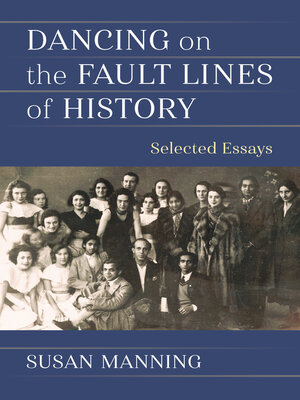Dancing on the Fault Lines of History
ebook ∣ Selected Essays · Studies in Dance: Theories and Practices
By Susan Manning

Sign up to save your library
With an OverDrive account, you can save your favorite libraries for at-a-glance information about availability. Find out more about OverDrive accounts.
Find this title in Libby, the library reading app by OverDrive.



Search for a digital library with this title
Title found at these libraries:
| Library Name | Distance |
|---|---|
| Loading... |
Dancing on the Fault Lines of History collects essential essays by Susan Manning, one of the founders of critical dance studies, recounting her career writing and rewriting the history of modern dance. Three sets of keywords—gender and sexuality, whiteness and Blackness, nationality and globalization—illuminate modern dance histories from multiple angles, coming together in varied combinations, shifting positions from foreground to background. Among the many artists discussed are Isadora Duncan, Vaslav Nijinsky, Ted Shawn, Helen Tamiris, Katherine Dunham, José Limón, Pina Bausch, Reggie Wilson, and Nelisiwe Xaba. Calling for a comparative and transnational historiography, Manning ends with an extended case study of Mary Wigman's multidimensional exchange with artists from Indonesia, India, China, Korea, and Japan.
Like the artists at the center of her research, Manning's writing dances on the fault lines of history. Her introduction and annotations to the essays reflect on how and why these keywords became central to her research, revealing the autobiographical resonances of her scholarship as she confronts the cultural politics of the late twentieth and early twenty-first centuries.
Like the artists at the center of her research, Manning's writing dances on the fault lines of history. Her introduction and annotations to the essays reflect on how and why these keywords became central to her research, revealing the autobiographical resonances of her scholarship as she confronts the cultural politics of the late twentieth and early twenty-first centuries.







